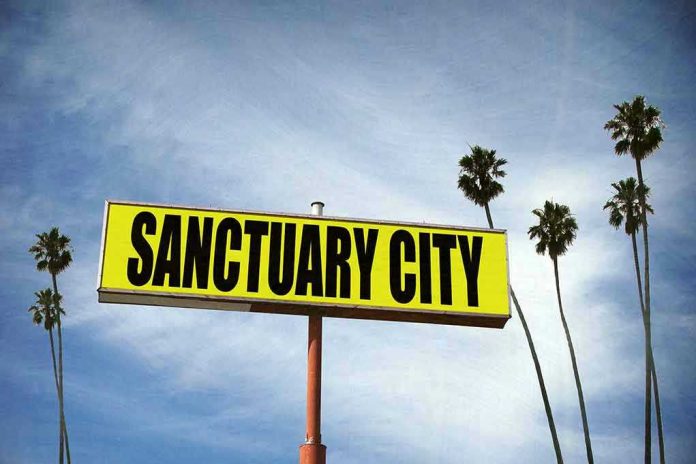
Louisville bends the knee to the DOJ, discarding its “sanctuary city” status, igniting both relief and outrage.
At a Glance
- Louisville drops its sanctuary city ordinance under DOJ pressure.
- The city aligns detention policies with federal immigration laws.
- Local immigrant communities fear increased ICE activity.
- Federal funding threats influenced the policy reversal.
Louisville’s Sanctuary City Status Revoked
Louisville, Kentucky, has ended its stance as a “sanctuary city,” succumbing to pressure from the Department of Justice. This move marks a significant shift in local immigration policies, aligning the city more closely with federal laws. The decision comes after years of being under the microscope as a “sanctuary jurisdiction” by the U.S. Department of Homeland Security, a label that brought increased federal scrutiny and threats to withhold crucial funding.
The city’s immigrant communities, which have long advocated for policies that limit local law enforcement’s cooperation with ICE, now face an uncertain future. The fear of heightened ICE activity is palpable among residents who worry about over-policing and the erosion of trust with local authorities.
Pressure from the Top: Federal Leverage
Federal pressure has been a persistent force, with threats to cut off funding for non-compliance looming over local governments. Louisville’s decision to drop its sanctuary city ordinance is a direct response to these pressures. The city’s leaders have expressed a need to maintain funding streams that are vital for various city programs and law enforcement operations.
This decision, while ensuring continued federal support, may come at the cost of community trust. Police-community relations could suffer, particularly in immigrant neighborhoods where fear of deportation and detention looms large. The Louisville Metro Council, alongside the Mayor’s Office, faces the complex task of balancing federal demands with the concerns of their constituents.
Implications for Immigrant Communities and Local Governance
For Louisville’s immigrant communities, the repeal of sanctuary policies represents a significant setback. The risk of detention and deportation is now more pronounced, potentially leading to increased fear and reluctance to engage with local authorities. This is a classic case of federal overreach influencing local policy, raising questions about the autonomy of local governance in the face of national mandates.
On the other hand, local government officials argue that compliance with federal laws is necessary to avoid punitive measures that could cripple city operations. Maintaining access to federal funding is a priority, but it comes with the challenge of addressing the concerns of advocacy groups and immigrant rights organizations that decry the move as a step back for civil rights.
Broader Consequences and National Ramifications
The story of Louisville is not unique. Across the nation, cities are grappling with similar pressures, finding themselves caught between federal dictates and local priorities. Louisville’s policy reversal may set a precedent for other cities facing the same federal scrutiny, possibly leading to a domino effect in policy changes.
From an economic perspective, the retention of federal funding ensures that critical city services continue without interruption. However, the social fabric of the community may be strained, with immigrant populations feeling marginalized and wary of engaging with law enforcement. Politically, this decision reinforces the ongoing national debate over immigration policy and local governance autonomy.
Sources:
Louisville News – Council Members React
ACLU Kentucky – Metro Council Vote
Louisville Government – LMDC Change
Forward Kentucky – Immigration Policy Changes
LPM News – Immigration Enforcement Ordinance







